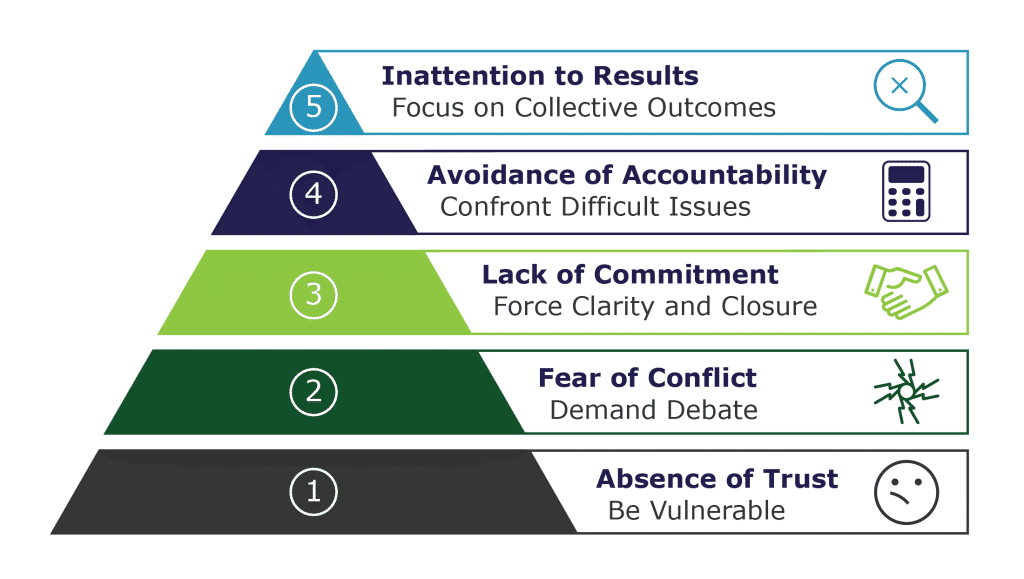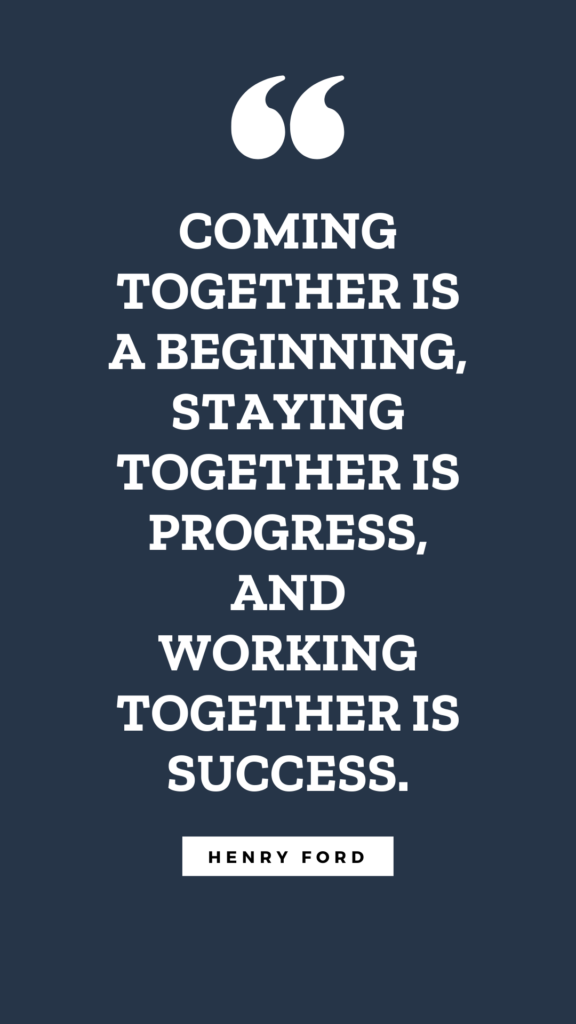Henry Ford said, “Coming together is a beginning, staying together is progress, and working together is success.” The quote has also been attributed to American author Edward Everett Hale, but the sentiment remains constant regardless of who said it. No one builds a successful business alone. It takes a team of people pulling in the same direction to make the dream work.
A team is a defined group of individuals who work together in an organized effort toward realizing shared goals. The team members are dependent on each other to achieve said goals, and all members have committed to being accountable to each other. They ensure a diversity of perspectives, skills, and talent, increase capacity, and foster human connection. Organizations that consistently achieve fantastic results are supported by high performing teams.
The Five Dysfunctions of Teams
The challenge is teamwork is hard. As humans, we have a universal need to be a part of a group but working together toward a shared goal is not easy. Using a model to understand how teams fail is helpful to finding a solution. The Five Dysfunctions of a Team, a seminal book by Patrick Lencioni, explores common underlying causes of team failures and recommends approaches to avoid or correct them. The model is illustrated as a pyramid with five levels of dysfunction and the corresponding response. Each level must be addressed, and the corresponding dysfunction must not be present to move to the next level. The five dysfunctions include:
- Absence of Trust → Be Vulnerable
- Fear of Conflict → Demand Debate
- Lack of Commitment → Force Clarity and Closure
- Avoidance of Accountability → Confront Difficult Issues
- Inattention to Results→ Focus on Collective Outcomes

Leaders who move their teams through each level within Lencioni’s model will benefit from a transformed team creating a culture of excellence and continued momentum toward organizational goals. Learn more about how you can help your team through each level in our online course, Leading Teams. The following stories emphasize the importance of teamwork and how great teams are achieved.
Alone No Longer
Pixar University, Pixar’s internal education and training operation, has a university crest engraved with the Latin phrase Alienus Non Diutiusor “alone no longer”. The mantra speaks to their organizational model and how they have removed silos and invested in innovation by connecting teams. Pixar’s model began with Steve Jobs, who bought the company for $10 million in 1986. The company struggled, and in 1990 it lost more than $8.3 million. Despite Pixar’s struggles, Jobs continued to invest in the company.
In 2000, Jobs purchased an old canning factory on 16 acres to be transformed into Pixar’s new campus. The original design included three separate buildings, but Jobs believed the most important function, interaction between employees, should occur at the center of the building. Therefore, he instead called for the design of a single space with an open atrium at the center. The next obstacle was getting the employees to utilize this space. Jobs put all high traffic areas in the atrium, including mailboxes, meeting rooms, the cafeteria, coffee bar, gift shop, and bathrooms. Putting the high traffic areas near each other caused employees who normally would never interact to strike up conversations and made collaboration effortless. By bringing everyone together, Jobs effectively prevented projects from being passed from one department to the next – reducing disconnect and increasing quality. The success of the open concept model is evident from Pixar’s success following the opening of the Pixar campus. A company purchased for $10 million was worth $7 billion only two decades later. Although Steve Jobs was the visionary behind a new way to work, it was Pixar’s teams that led to the success of the company.

Teamwork and Psychological Safety
Google believed they knew how to build an effective team. Google executives assumed the best teams share similar traits, behaviors, and personalities and form friendships outside of work. Ironically, a company that has spent an incredible amount of money studying their workers to understand how behaviors and decisions contribute to productivity and workplace effectiveness had never tested their assumptions about what makes a great team.
In 2012, Google began a new initiative – Project Aristotle – to examine hundreds of Google teams and determine why some struggle and others succeed. The project included statisticians, psychologists, sociologists, engineers, and researchers. The members of Project Aristotle analyzed the behaviors, interests, and backgrounds of team members and various compositions of individuals. However, regardless of how they organized the data, they couldn’t find a pattern indicative of team efficacy. Even teams nearly identical in composition with overlapping membership showed drastically distinct levels of effectiveness.
Eventually, the initiative discovered individual characteristics do not influence teams as much as group norms, and great teams share two types of behavior. First, highly effective teams exhibit an even distribution of conversational turn-taking. Secondly, great teams consist of members skilled at discerning others’ feelings, referred to as social sensitivity. The impacts of conversational turn-taking and social sensitivity led Google to conclude that psychological safety, belief the team will not shame or chastise someone for speaking up, is the critical piece to the effective team puzzle.
Taking Your Team to the Next Level
Although teamwork is difficult and complex, the benefits of building a great team are endless. Examples from companies such as Google and Pixar help us understand concepts related to team formation are put into practice. However, there is much more to learn about taking a team to the next level. To learn more about taking your team to the next level, enroll in our online program, Transforming Teams & Teamwork. The online and self-guided program is designed to help individuals and organizations create powerful teams that make dreams a reality.



